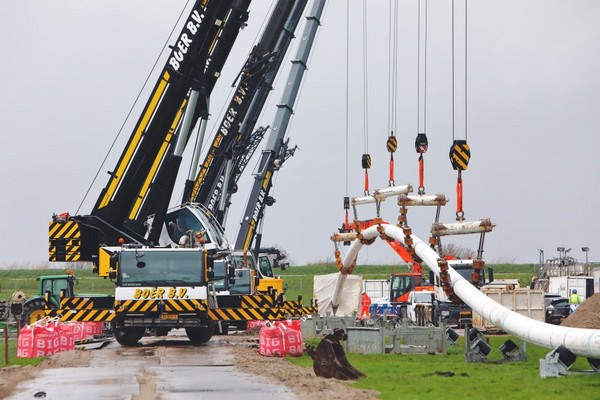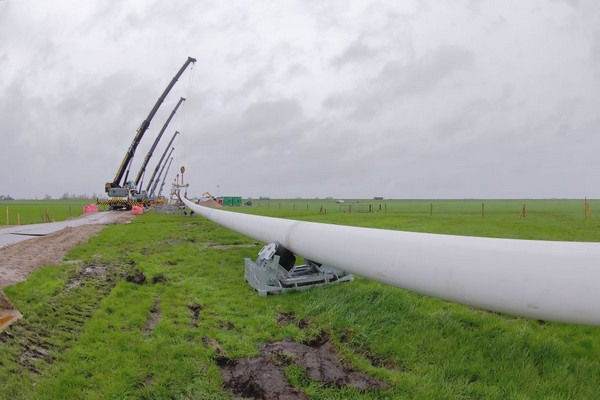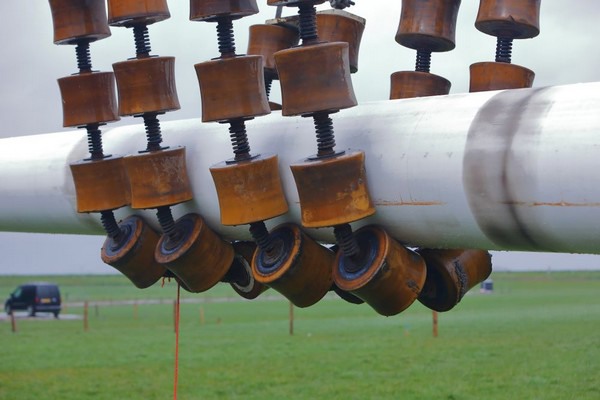OCAP's CO2 network is being extended to the Dutch De Kwakel-Kudelstaart greenhouse area. On March 31, a spectacular drilling took place under the Westeinderplassen: a directional drilling of no less than 1,500 linear meters. Huge cranes held up the pipeline as it was pulled meter by meter into the borehole.
This pipeline is part of OCAP's CO2 network linking the industry in the port of Rotterdam with the greenhouse horticultural areas in Westland, Oostland, and Greenport Aalsmeer. The new pipeline will pass from Weteringweg in Leimuiderbrug under the Westeinderplassen to the horticulturists in the Aalsmeer region.

Essential
CO2 is essential for greenhouse horticulture companies to grow their crops. If external CO2 is not available to them, they are forced to use their gas-fired boilers to grow crops. In practice, that means firing in the summer, when the plants are growing the most, while not using the heat. With the arrival of the CO2 network, this is no longer necessary: the CO2 is captured at industrial locations and transported to the greenhouse horticulture via this new pipeline network. This greatly reduces the use of natural gas.

Making it sustainable
The construction of this new pipeline is made possible by a substantial subsidy from the province of North Holland. Ilse Zaal, a member of the Provincial Executive for Agriculture and Economy in North Holland province, thinks this is a good development for the growers in De Kwakel-Kudelstaart and the greenhouse horticulture sector in general. "With this CO2 pipeline, we are going to fulfill an important precondition for making greenhouse horticulture in this region even more sustainable. The captured CO2, a residual product from the industry, will be put to good use again in growing flowers, plants, and vegetables in the greenhouse. It is very important to provide space for this sustainability, which is why we support it from the province."
Capture
For more than 15 years, OCAP has been capturing CO2 from Shell and Alco Energy, among others, in the Rotterdam port area and delivering this pure CO2 via pipeline to various horticultural areas. This CO2 would otherwise be emitted into the atmosphere, and by putting it to use for the plants in the greenhouses, it provides profits for the horticulture sector. Annually, horticulture can now dispose of 600,000 tonnes of CO2 that greenhouse growers would otherwise have to produce by burning some 330 million m3 of natural gas.

Good for plants and people
Bromelia grower Bjorn Bunnik has his company in De Kwakel. Bunnik Bromeliads covers some 10 hectares where Vriesea, Guzmannia, and Pineapple are grown. According to Bjorn, they are working hard to significantly minimize the footprint of their production. "CO2 is a waste product from industry but a nutrient for plants. By transporting CO2 from industry through the OCAP pipeline to our nursery, our plants can convert the CO2 into oxygen. We thus create a conversion from a waste product into oxygen. Good for both plants and people."
Accessibility
The municipality of Uithoorn is also happy with the expansion. According to alderman Jan Hazen (business climate and economic affairs), this will bring environmental benefits in several areas. "Greenhouse horticulture is an important part of our local economy. The OCAP pipeline contributes to a higher efficiency of cultivation and, thus, a better return. The environmental gain is not only in the reduction of fossil fuels but also in the fact that there is no need for tanker trucks carrying CO2 from Rotterdam to our area to deliver. This is good for the environment, but also for our accessibility."
The work is expected to be completed before the summer. Then the first greenhouses in the area can be connected to this pipeline, and greenhouse farmers will start reusing CO2. This will make them less dependent on natural gas and enable them to further realize their sustainability ambitions.
Source: Greenport Aalsmeer
